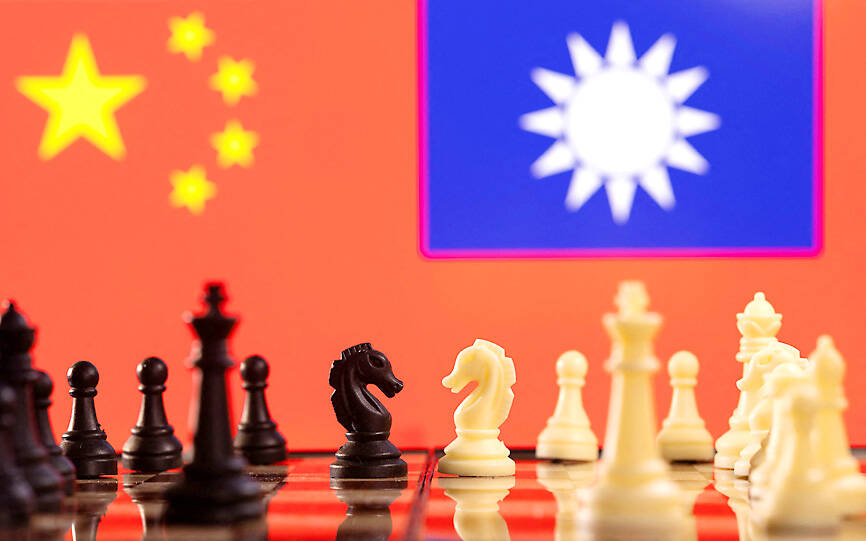China is targeting projects to enhance public spaces in its “united front” tactics, a lawmaker said yesterday after New Taipei City-based cultural conservation group Am Kehnn Cultural Workshop (暗坑文化工作室) said that Beijing has conducted a covert campaign to infiltrate Taiwanese placemaking projects.
Taiwan’s placemaking scene is awash with Chinese money, Am Kehnn Cultural Workshop wrote on Facebook on Thursday, adding that almost every region in the nation was among the winners at a cross-strait construction and creation contest held by China’s Fujian Province.
Beijing’s campaign to fund projects to enhance public spaces poses a greater danger to Taiwan than its support of local temples, as people who run the projects tend to be highly influential members of their communities, the group said.

Photo: Reuters
Chinese infiltration targeting Taiwan’s grassroots efforts to renovate local communities, mainly headed by the Fujian provincial government, appeared to focus on poaching Taiwanese talent, buying the support of local grassroots organizations and spreading pro-China narratives, the group said.
Chinese state-run news Web platform People.cn reported that Fujian has recruited 95 Taiwanese architectural and cultural industry entities and 300 people in related fields to work for the province’s own placemaking initiatives, the group said.
On Friday, the group named dozens of entities that allegedly received funding from Fujian. The list comprised mostly local businesses and education institutions, including Dayeh University in Changhua County and Tunghai University in Taichung.
The group cited information from the cross-strait construction and creation contest and public announcements of the universities’ exchange programs as evidence.
The competition cannot be said to be apolitical, as Article 9 of the event’s governing charter stipulates that placemaking projects that compromise Chinese national secrets or have negative social effects are to be excluded from consideration, it said.
The rule is a veiled reference to prevent projects that express Taiwanese localism from winning, it said.
Its rules also stipulate that the event should be broadly promoted by the media, showing that it was part of Beijng’s so-called “great external propaganda efforts,” Am Kehnn Cultural Workshop said.
Democratic Progressive Party Legislator Wang Ting-yu (王定宇) yesterday said that the targeting of placemaking was a new development in China’s continued “united front” tactics.
By providing financial support, Beijing seeks to build rapport with the nation’s cultural industry, which would be a useful instrument to broaden China’s influence over ordinary people, Wang said.
Beijing’s willingness to spend money on the cultural industry in Taiwan when nearly 300 million rural Chinese are on the poverty line shows that its efforts are intended to undermine Taiwan, he said.

SECURITY: As China is ‘reshaping’ Hong Kong’s population, Taiwan must raise the eligibility threshold for applications from Hong Kongers, Chiu Chui-cheng said When Hong Kong and Macau citizens apply for residency in Taiwan, it would be under a new category that includes a “national security observation period,” Mainland Affairs Council (MAC) Minister Chiu Chui-cheng (邱垂正) said yesterday. President William Lai (賴清德) on March 13 announced 17 strategies to counter China’s aggression toward Taiwan, including incorporating national security considerations into the review process for residency applications from Hong Kong and Macau citizens. The situation in Hong Kong is constantly changing, Chiu said to media yesterday on the sidelines of the Taipei Technology Run hosted by the Taipei Neihu Technology Park Development Association. With

CARROT AND STICK: While unrelenting in its military threats, China attracted nearly 40,000 Taiwanese to over 400 business events last year Nearly 40,000 Taiwanese last year joined industry events in China, such as conferences and trade fairs, supported by the Chinese government, a study showed yesterday, as Beijing ramps up a charm offensive toward Taipei alongside military pressure. China has long taken a carrot-and-stick approach to Taiwan, threatening it with the prospect of military action while reaching out to those it believes are amenable to Beijing’s point of view. Taiwanese security officials are wary of what they see as Beijing’s influence campaigns to sway public opinion after Taipei and Beijing gradually resumed travel links halted by the COVID-19 pandemic, but the scale of

A US Marine Corps regiment equipped with Naval Strike Missiles (NSM) is set to participate in the upcoming Balikatan 25 exercise in the Luzon Strait, marking the system’s first-ever deployment in the Philippines. US and Philippine officials have separately confirmed that the Navy Marine Expeditionary Ship Interdiction System (NMESIS) — the mobile launch platform for the Naval Strike Missile — would take part in the joint exercise. The missiles are being deployed to “a strategic first island chain chokepoint” in the waters between Taiwan proper and the Philippines, US-based Naval News reported. “The Luzon Strait and Bashi Channel represent a critical access

Pope Francis is be laid to rest on Saturday after lying in state for three days in St Peter’s Basilica, where the faithful are expected to flock to pay their respects to history’s first Latin American pontiff. The cardinals met yesterday in the Vatican’s synod hall to chart the next steps before a conclave begins to choose Francis’ successor, as condolences poured in from around the world. According to current norms, the conclave must begin between May 5 and 10. The cardinals set the funeral for Saturday at 10am in St Peter’s Square, to be celebrated by the dean of the College